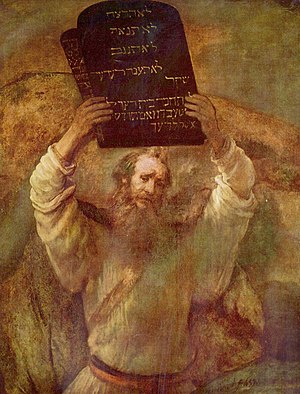 Image via Wikipedia
Image via WikipediaPENTECOST IN EXODUS
This festival is introduced in Exodus 23:16 ("the Feast of Harvest, of the firstfruits of your labor, of what you sow in the field."); 34:22 ("the Feast of Weeks, the firstfruits of wheat harvest"); Leviticus 23:15-21 ("firstfruits to the Lord"); Numbers 28:26-31 ("On the day of the firstfruits, when you offer a grain offering of new grain to the Lord at your Feast of Weeks, you shall have a holy convocation."); and Deuteronomy 16:9-12 ("the Feast of Weeks"). The children of Israel were instructed to count seven weeks (or 50 days) from the Feast of Unleavened Bread (immediately following Passover). This day was to be observed as a Feast of Firstfruits of the wheat harvest; and, in keeping this festival, Israel was to recognize Yahweh as the provider of the harvest.
Remember, the first Passover marked the beginning of the Exodus from Egypt (Exodus 12). It was approximately seven weeks after the Passover that Israel entered into the wilderness of Sinai and set up camp before the mount while Moses went up to meet with God (Exodus 19:1-3). Up on Mt. Sinai, seven weeks after Passover, God established a covenant relationship with the children of Israel. He claims them as a "treasured possession," as "a kingdom of priests," and as "a holy nation." He also gives to them covenant instructions.
We normally speak of these divine instructions as the Law or as the Ten Commandments. However, our modern understanding of the term law is too rigid a translation for the Hebrew torah. If this was explained to me previously, I totally missed it, but it clicked when I read John Hobbins's blog post, "Psalm 1:1-2: Exegetical Notes," in which he argues for translating torah as "direction" or "instruction." Here's his argument:
Instruction is a better translation of torah than law. After all, torah in the Bible is the term used for a mother’s instruction of her child (Prov 1:8). To be sure, law with reference to God’s instruction has the advantage of equivalence with Greek nomos in the sense of a body of norms, used of יהוה’s law / the law of Moses in the Old Greek Pentateuch and thereafter. NJPSV and Alter have teaching in Ps 1:2. NJPSV has instruction in Josh 1:8; Buber-Rosenzweig chose to translate torah with the inimitable “Weisung” = direction.

The traditional rendering of tôrâ by "lex" (Augustine), "Gesetz" (Luther), and "Law" (English versions) is misleading, for the sense of law in the Western world derives from the Roman world. Law in our world denotes an impersonal code of conduct and actions recognized as binding and enforced through penalties by a controlling authority. But tōrâ in the Hebrew Bible means primarily "catechistic teaching," which gives the elect nation instruction and guidance and is its constitution. The Ten Commandments, for example, have no penalties attached directly to each of them. The term is so rich in meaning that it is best transliterated. (405n1)
 I also found help from a book I have thoroughly enjoyed and recommend to anyone looking for a current and accessible survey of Old Testament Theology; Robin Routledge's Old Testament Theology: A Thematic Approach
I also found help from a book I have thoroughly enjoyed and recommend to anyone looking for a current and accessible survey of Old Testament Theology; Robin Routledge's Old Testament Theology: A Thematic ApproachFollowing the Sinaitic covenant, the instrument through which God would fulfil his promise to bring blessing to the world was enlarged from an individual and his family to a nation. God would reveal himself to the world through Israel's life as a community. To fulfil this calling, though, Israel needed to know what it meant to live as the covenant people of God. So, alongside the covenant that set Israel apart as his people, God gave the Law. The Law gave the people the opportunity to respond to God in loving obedience. It was also a restraint: it gave guidance and instruction in godly living and served as a means by which the distinctive character of the people, and with it the effectiveness of their witness, might be preserved. Seen in this way the Law was regarded positively. It was revelation from God, setting out the path of life in fellowship with him, and was something in which the OT saints could take delight (e.g. Ps. 19:7-11). (173, emphasis mine)Why does this interest me at this point in time? Well, I find this helpful because it informs me that the Torah is so much more than a list of rules and regulations. The perspective that the Law of God is a burden I cannot bear has troubled me for a long time. For years I have only seen the negative side of the commandments. However, I am coming to understand that the Torah of Yahweh is a means of nurturing a relationship with his covenant people, not a device by which God crushes all who do not measure up his holy standards. Yes, there are more negative instructions than positive ones, but I am becoming more and more convinced that the instruction of Yahweh is for my benefit.
Galatians 3:23-24
Until the time when we were mature enough to respond freely in faith to the living God, we were carefully surrounded and protected by the Mosaic law. The law was like those Greek tutors, with which you are familiar, who escort children to school and protect them from danger or distraction, making sure the children will really get to the place they set out for. (The Message Remix

 )
)
I found this truth illustrated in the story of Ruth. So, before we move on to Acts 2, I'd like to comment on Ruth. (Go to Part 2)
PENTECOST IN RUTH (Part 2)
PENTECOST IN ACTS (Part 3)









